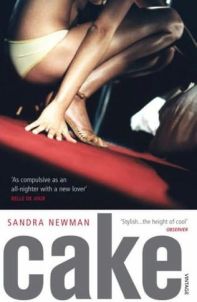Filed under: art, interview | Tags: $$$, academy, art, ethics, genius, poverty, starving artist, writing
Sandra Newman is the author of the novels Cake and The Only Good Thing Anyone Has Ever Done; as well as the book How Not to Write a Novel (co-written with Howard Mittelmark); and has published short fictions in numerous venues, notably in Conjunctions (<–read “The Potato Messiah”). She was interviewed in MP#3 about Cake, bank robbery, and gender and experimental writing.
Here’s what she had to say about the writing life and $$ woes. (Interview conducted by Leeyanne Moore.)
When you use the term “starving artist” in relation to yourself, how literal are we talking in terms of actual starving? What would you count as part of the territory that comes with being a “starving artist” and what would you disallow?
I haven’t ever been starving in the food sense; in my experience, in the Western world, the only way one could arrive at “starving” would be via ”utterly friendless.” And while my adventures in nearly starving have put a strain on my relationships sometimes (I don’t often borrow money, but I do stay on people’s couches for prolonged periods of time in my recurring dry spells), this has never gone into friendless territory. People with non-art jobs have all the food in the world, in my experience. In fact, you can pretty much make a three-course meal in the kitchen of a gainfully employed person without them ever knowing that the food is gone.
For me, most of being a starving artist in America is about taking risks that other people aren’t willing to take, sacrificing status, and often — the part no one ever talks about — making selfish decisions about other people’s welfare. Any starving artist with parents is at the very least making those parents miserable. In the vast majority of cases, s/he is also spending those parents’ money, which the parents perhaps had plans for and wished to spend themselves. Finally, any starving artist with children is going to feel like a criminal at certain points. There is no point pretending that the children would not have a better prospect in life if you worked for a reinsurance company and could afford to send them to private school. The children will be paying for your art career for the rest of their lives, in many cases. Of course, there’s no guarantee that you would have been a great success in your other, purely imaginary, business — no doubt you would just have become a starving, untalented claims adjuster. This point, however, tends not to impress anyone — people will generally relate to the artist as if she could have become a millionaire in any other field at all, at will.
What’s been your most profound moment as a starving artist in terms of suffering? Has this shaped how you view your art or how you view the world & humanity?
For me, the worst part of being a starving artist is (as alluded to above) that one cannot afford to be ethical. This is a common feature of any poverty: Brecht writes a lot about this. In the modern world, this is usually a fairly harmless thing, amounting to a sin of omission generally. You can go a long time without confronting this, but eventually there will come a time when the choice is between doing the right thing and, for instance, getting your book finished. So you end up finishing the book, even though it means living off your partner for a few months, for instance, and you know the partner has no belief that your book will sell, and in fact, your partner thinks you should get a job in insurance, because this artist crap is going nowhere. Soon the partner is gone, sans a fair chunk of money, and the book is left behind as a monument to your warped priorities.


